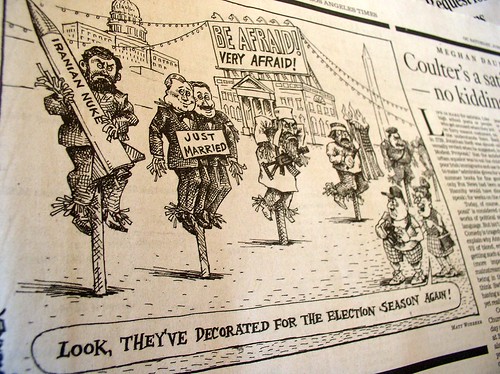Charles Osgood, former host of ‘CBS Sunday Morning,’ dies at 91
LA Times #LATimes

Charles Osgood, the bow-tie-wearing former host of “CBS Sunday Morning” and a fixture for decades on network radio, died Tuesday at his home in New Jersey, CBS News reported. He was 91.
Osgood had been suffering from dementia, according to a CBS News representative.
Osgood was a weekend companion for millions of viewers during his 22-year run as host of “CBS Sunday Morning,” the admired news magazine known for its elegantly written in-depth stories and occasional high-minded subject matter.
Osgood took over the job from Charles Kuralt in 1994 and remained its host until October 2016, when he was well into his 80s. He was succeeded by Jane Pauley. The stature and popularity of “Sunday Morning” grew under Osgood.
Osgood was long the signature voice of the CBS Radio Network. His morning newscasts and regular commentary feature called “The Osgood File” were carried on stations across the country — including KNX in Los Angeles — from 1971 to 2017. He also wrote and hosted a weekend series called “Newsmark.”
Though Osgood became a TV star on “CBS Sunday Morning,” he never left radio and always expressed his preference for it. His television sign-off was, “See you on the radio,” which also was the title of one his books.
“Television is wonderful and I don’t mean to take anything away from it, but the fact is that a TV picture is very literally “what you see is what you get,” Osgood said in a 1991 interview. “You bring your own experience and emotions to radio that you don’t to television. I do think that radio is more visual. It’s a paradox but it’s true.”
At the height of his radio career, Osgood was reaching more than 11 million listeners a week. His popularity as a national radio news personality was rivaled only by ABC’s Paul Harvey, who died in 2009.
Osgood’s warm, avuncular delivery was so distinctive, and in demand from radio advertisers, that the network allowed him to read commercial copy, exempting him from a company policy that prohibited such a practice for journalists. Occasionally, he delivered commentaries written in whimsical verse and became known as CBS’ poet in residence.
Osgood’s popularity on the radio side led to TV assignments in the 1980s. He was anchor of the “CBS Morning News” and the Sunday edition of the “CBS Evening News,” before taking over for Kuralt on “CBS Sunday Morning.”
Born Charles Osgood Wood III on Jan. 8, 1933, in the Bronx, N.Y., he grew up in Baltimore. His radio career began when he attended Fordham University where he worked at the school’s radio station. He later joined classical music radio station WGMS in Washington, D.C., where at one time he was assigned to do a program that was piped into Dwight D. Eisenhower’s hospital room where the president was recovering from a heart attack.
Osgood’s knowledge of classical music helped him land a job as announcer for the United States Army Band when he entered the military.
“I ran into a guy while I was having dinner with a friend of mine and he was dressed in a white uniform,” Osgood told The Times in 1991. “He was the announcer for the United States Army Band. I asked him when he was getting out and he said within the next few weeks, so the next morning I was parked out at the commanding officer’s office. He was impressed with the fact I could pronounce Rimsky-Korsakov. That’s how I got the job.”
In early 1963, Osgood moved to Hartford, Conn. where he became general manager of WHCT-TV, an early subscription television channel owned by RKO General. A precursor to cable, the service used a technology called Phonevision to deliver first-run movies and live sporting events through phone lines and a decoder installed in the home.
Later that year, he joined ABC News as a writer for a radio news series called “Flair Reports,” and covered live events for the network. He began going by Charles Osgood on the air because ABC already employed an announcer named Charles Woods.
In 1967, Osgood joined CBS Radio in New York where he was part of the launch of the division’s all-news station, WCBS, better known as Newsradio 880. He joined the network four years later.
Osgood was a musician who played the piano and banjo. He once purchased a Steinway piano from Columbia Records that had been used by Rudolf Serkin and Glenn Gould.
Osgood performed on his programs and occasionally at live concerts with orchestras such as the Boston Pops. He is a co-writer of “Gallant Men,” a song that became an unlikely top 40 hit for Everett McKinley Dirksen, a Republican U.S. senator from Illinois, in 1967. It won a Grammy Award for best spoken word, documentary or drama recording.
Osgood authored several books including “Nothing Could Be Finer Than a Crisis in the Morning,” and “There’s Nothing I Wouldn’t Do If You Would Be My POSSLQ,” both collections of his radio commentaries. He performed as the narrator in “Horton Hears a Who!,” the 2008 animated film based on the Dr. Seuss book.
Osgood is survived by his wife, Jean Crafton, whom he married in 1973, and five children: Kathleen, Winston, Anne Elizabeth, Emily Jean and Jamie.